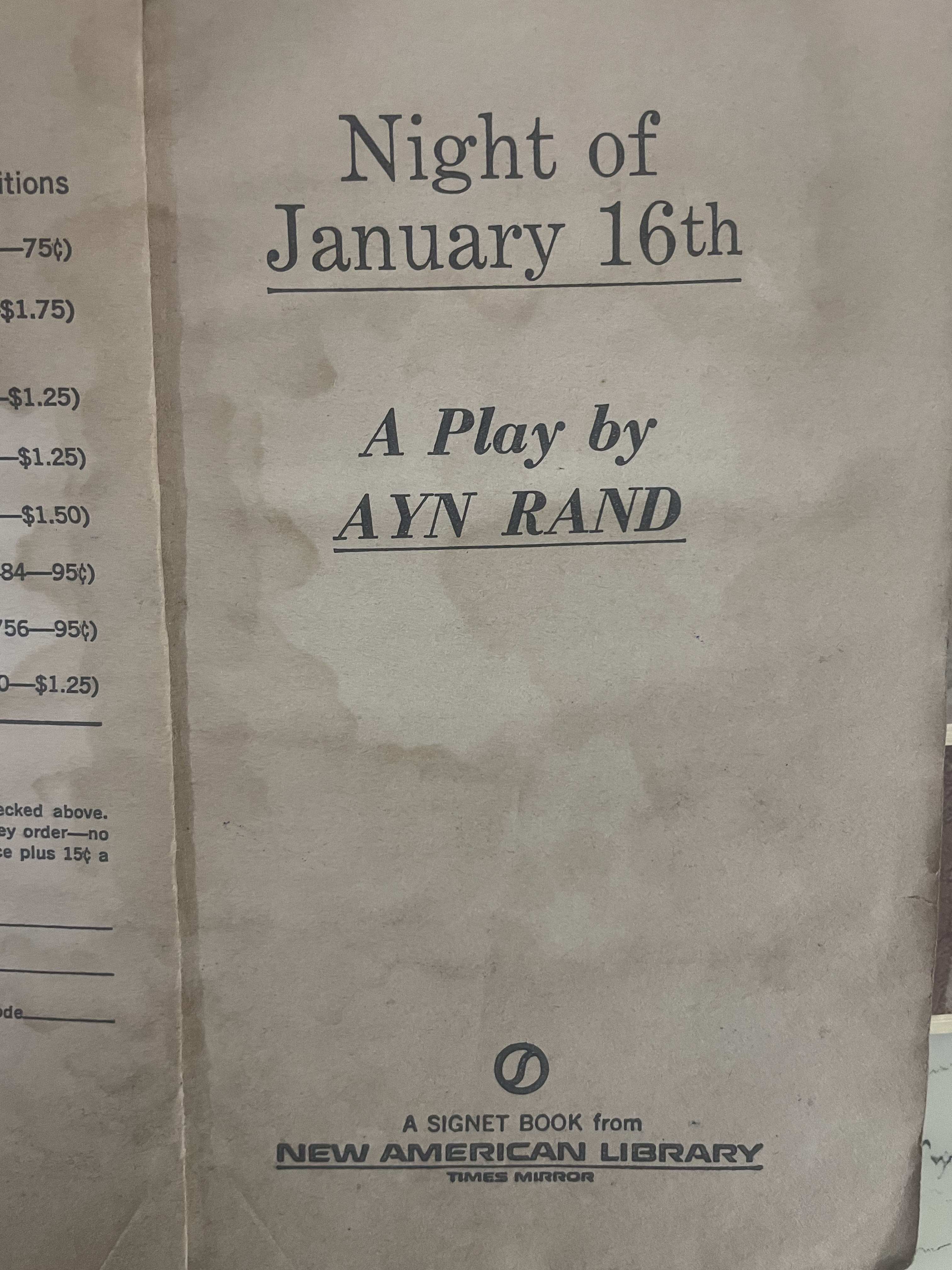Night of January 16th

About
Summary
Exquisite
TOC
Details
Related
URL
Images
Overview
Night of January 16th is a play by Ayn Rand, first produced in 1934 under the title Woman on Trial and later re-titled for its Broadway debut in 1935. Inspired by the death of Swedish industrialist Ivar Kreuger, the play uniquely involves the audience as jurors in a murder trial.The play unfolds entirely within a courtroom, where Karen Andre is on trial for the murder of Bjorn Faulkner, her former boss and lover. Faulkner, a business executive, fell to his death from his penthouse on the night of January 16th. The play does not depict the events leading to Faulkner's death directly; instead, the audience-turned-jury must rely on witness testimonies to determine Andre's guilt or innocence.
Importance of Book
Innovative Format: The play's unique use of audience participation as jurors made it a groundbreaking theatrical experience.
Exploration of Philosophical Themes: Night of January 16th introduces Rand's philosophical ideas in an accessible and engaging way, predating her more explicit philosophical works like Atlas Shrugged.
Dramatization of Individualism: The play serves as a powerful dramatization of individualism, celebrating self-reliance and independent thought.
Key Themes
Individualism vs. Conformity: Rand described Night of January 16th as a sense-of-life play, not meant to be taken literally but as a dramatization of different approaches to life. Karen Andre represents individualism, ambition, self-confidence, and independence, while the prosecution witnesses embody conformity, envy, servility, hatred, and the lust for power. Rand believed the jury's verdict would reveal their own attitude towards these conflicting values.
Objectivism: The play explores the beginnings of Rand's ethical philosophy, which would later be known as Objectivism. Rand's Objectivism emphasizes the importance of reason, individualism, and self-interest. In Night of January 16th, Rand conveys the viewpoint that Your life, your achievement, your happiness, your person are of paramount importance.
Moral Judgement: The play compels the audience (as jury) to grapple with questions of morality and justice. The proper verdict is not dictated by the factual evidence. Rand divides the characters sharply in their attitudes toward sexual pleasure.
Values and Sense of Life: The play examines the fundamental values that guide human actions. Rand stated that each major character embodies one of two basic and opposite attitudes toward life: independence vs. conformity.
Cultural Significance
Night of January 16th holds cultural significance as an early expression of Ayn Rand's philosophy, which has had a lasting impact on American thought and culture. The play's themes of individualism, self-reliance, and rational self-interest continue to resonate with audiences today.
Effects on Society
Popularized Rand's Ideas: Night of January 16th helped introduce Rand's ideas to a wider audience, laying the groundwork for her later success as a novelist and philosopher.
Influenced Theatrical Innovation: The play's innovative format influenced subsequent theatrical productions, encouraging greater audience participation and experimentation.
Sparked Debate: The play's themes of individualism and conformity sparked debate and discussion, challenging audiences to examine their own values and beliefs.
Conclusion
Night of January 16th by Ayn Rand is a thought-provoking play that explores the conflict between individualism and conformity. Its innovative format and compelling themes have made it a significant work in American theater and a lasting contribution to the dissemination of Rand's philosophical ideas. By placing the audience in the role of the jury, Rand compels viewers to confront their own values and beliefs, making the play a powerful and enduring exploration of human nature.
While Rand disliked changes made to the script for the Broadway production and amateur versions, she re-edited the script in 1968 for publication as the definitive version. The play continues to be performed and studied today, ensuring its continued relevance in contemporary society.
Table of Content
The specific table of contents for the 1971 edition of \"Night of January 16th\" by Ayn Rand. However, I can give you a general idea of the structure and themes of the play.Overview of Sections:
Introduction: Background on the play\'s context and its themes of individualism and morality.Act 1: Introduction of the main characters and the central conflict surrounding the trial of the protagonist, who is accused of murder.Act 2: Development of the plot through courtroom scenes, where various characters present their testimonies and perspectives.Act 3: Climax and resolution, culminating in the jury\'s verdict and the implications of the trial\'s outcome.
Title
Night of January 16th
Author
Ayn Rand
Name of Publisher
A Signet Book
Publish Date
1971
Subject
It is a unique courtroom drama that combines elements of a play and a philosophical exploration of individualism.
Vintage
1948-2000
Category
Literary
Sub Category
Drama
Rarity
Normal
